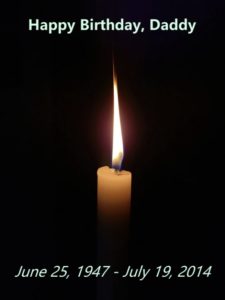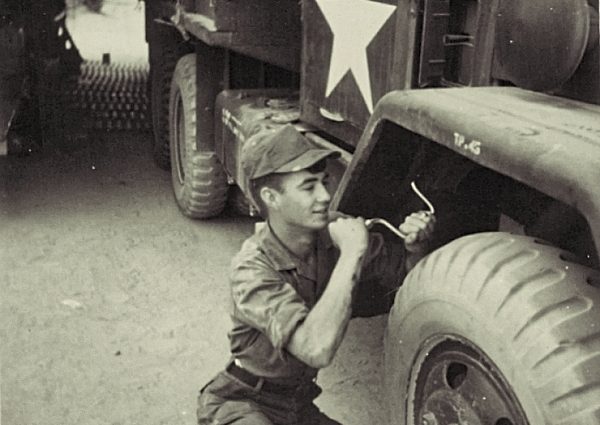Now my mind was again filled with memories of my mother’s homemade cakes. Boy, they sure were good. I wondered how they all were – my sisters and brothers. I wondered how my father was doing. My father didn’t write much, but he didn’t have to. I knew by now how he must have hurt for me. And he had paid his dues, believe me, during WWII in the Philippines. But Mommy would always write and always Daddy would send his love along with them all [the letters].
I remember Mom wrote me a letter once that said she’d had a bad dream and told me to stay away from big trucks. I, for some reason, a week or two later, had caught or hitched a ride on the running board of a Deuce and a half up An Khe Hill to the base camp of 1st Cavalry Headquarters. I don’t remember why or what for. But Mom’s dream came true just ahead. I turned and saw elephant grass move alongside the road, jumped off, and emptied a 20-round clip. Whatever was there was gone. I guess I searched for four or five minutes but I didn’t find anything. The convoy of ammo for 105 and 155 Howitzers was moving slow, and a couple of other boys were at the ready within sight of me. We ran up the hill to catch our trucks. A chill hit me. I remembered the letter, stopped sudden, and – BOOM! The very truck I’d been on was hit by a mine on the right front behind the wheel and fender. The running board was gone and the driver was dead. I could never thank God and Mom enough.
After I got to An Khe, I had a toothache and went into LZ English where I just knew the medevac medic tents had to have a dentist. Sure enough, one was there. That old tooth had been bothering me for a long time. A lot of GIs were there, so, I took my place, sat down, and just rested, hoping the pain would ease. I soon forgot it, though. I heard choppers – medevac choppers carrying wounded. They came straight down and four nurses ran to the gurneys and ran back with a soldier who, as they passed, I could see as I and everybody helped. He was shot six or seven times diagonally across the chest. I sat outside, sick in my heart that I could see inside the tent as doctors and nurses worked feverishly cutting away clothing. I don’t know who they were, but they were the best. The surgeon took a scalpel and, as fast as lightning, made a cut from the center of his neck down almost to his belly button; then he took some kind of saw and cut through his chest, exposing his heart and lungs. I turned my head and saw doctors and nurses passionately working on others. I heard the awful sound inside the tent. Small pieces of metal clanked into stainless steel pans. Then the soldier took a breath on his own and the doctor said,
“Thank God. He’s back with us.”
When I left, he was all closed up with what looked like staples, and he was breathing on his own, not yet conscious but alive and soon to be on a naval hospital ship, then headed home. Those nurses – the women – deserved as much credit as any of us over there. Thank God for them. You know, I never had any trouble out of that tooth again until years later.
It wasn’t long till I was back in the jungle again. It was July and I was a short-timer counting the days until I could hold my fiancé in my arms, if God saw fit. I sure did miss home. My thoughts went back to S.M. Marlow. He was from Tackett Creek, out past Jellico, back home in Tennessee. I wondered if his family knew. Oh Lord, don’t let him die. You see, that’s why Vietnam hardened boys as they became men. I couldn’t hardly wait to get my orders home. Once I did get home, I tried not to let it bother me, but it sure did. I know that this is far-fetched and only a skimpy part of a year in my life, but some things come back slow and some things are best forgotten. But it’s for sure, this time in my life made a scar upon my heart forever, even unto the grave, where we all must go.
I remember a small boy, probably six or seven years old. His name was Lum. I met Lum near Bong Son in Vietnam after a napalm strike on a nearby village. Lum was leaning against a partially burned out hut, scared, wet, and hungry. He was shaking so bad the wall quivered. That’s how I found him. His family was long gone and he had no one. I remember holding him close and felt he somehow knew not to be afraid of me. Oh, if only you could have seen the child. He had no shoes, no shirt, only a ragged pair of pants. His condition – physical and living – made me question the protesters and the draft dodgers back home. This was the reason – for Lum and for Freedom. There were good people there, and I never saw a hut or home with anything but a dirt floor the whole time I was there. I took Lum back to a village near LZ English. There, he could be safe. I never saw him for a long time after that day, but, even now, a little over thirty years later, I think of him from time to time, and wonder if he made it. He’d be a man now. I’m probably long forgotten by him.
I very seldom talk about my tour of duty. I guess people don’t understand that. My friends now often ask me,
“What’d you do over there in Vietnam?”
“Well,” I just say, “I was an SLT Operator, just a soldier.”
But every time I’m asked, I’m right back over there. I’m 47 years old now, have two granddaughters, two grandsons, and one on the way. My fiancé and I married and we’ve been together almost 28 years. But, I still, to this day, flash back to Vietnam. My daughter’s name is Delonda and she lives in Georgia with her husband and my grandson. She’s expecting another baby in March. My son, Benny, and his wife live nearby in Jacksboro, Tennessee with their daughters and son. I love them all. I sure never thought I’d have made it this far. I’d probably have been worthless because of the way we were treated when we came home.
My tour of duty was almost over in 1967, and I had two weeks left in that country. I had already been flown back to Cam Ranh Bay to prepare for departure to the United States, where I was to take a leave at home for a short time, then report to the Fort Campbell, Kentucky 553rd Military Police Company. Well, I can in no way tell you how happy I was, and, too, I was sad. Because, there in Cam Ranh Bay, a grim reminder of the war and its reality was still real and our boys were still dying there. I’d seen body counts after fire fights and battles, but, for the first time, I saw refrigerated cargo planes – countless bodies, all tagged and ready for shipment. Even now, I think of the mothers, sons, daughters, the fathers, girlfriends, boyfriends, grandchildren, and their families. Oh Lord, have mercy. I was one of the chosen to come back to my hometown. But, for sixty thousand sons and daughters, their trials and troubles were over. I even felt guilty that I was still alive and getting to come home. It was as if God had told me these brave soldiers gave their lives so I could return home.
The day finally came for me to leave. I actually ran to the plane. I was going home. I remember looking out as we taxied and turned down that long airstrip. As I looked out the window, my heart stood still. Tears welled up in my eyes because there, in his ragged pants, waving to me, was Lum. And all I could do was wave goodbye. I sat there for a long time and watched as he disappeared and the earth beneath us turned slowly to water. No land, just water, for hours. The pilot told us we would be landing in Okinawa to refuel. The stewardesses on the plane came out and welcomed us aboard. They were beautiful. The American Girls are the prettiest people in the world. I thought of my fiancé and could hardly wait until I got to a phone in the U.S.A. The stewardesses placed pillows behind our heads and even set our feet on cushions. We were getting the red-carpet treatment. Then there came a girl pushing a tray-like table filled with ice and drinks – any kind you asked for, it was there. But there wasn’t no Tennessee Moonshine. A sergeant sat next to me. The stewardess asked him what kind of drink he wanted and he said,
“Scotch whisky.” I was asked next. I said,
“The same, please.”
I’d never tasted scotch before. But I did then and it was awful. By the time we got to McCord Air Base in Seattle, Washington, though, I felt pretty good. I got off the plane and thanked God I was home. But home was still quite a ways down the road.

** Featured Image: Benny F. Shown, Sr. in Vietnam, around 1967. He told me once he staged this scene for my grandmother so she’d see the picture and wouldn’t worry about him. What disturbs me most as his daughter, I think, is his waist size because it indicates how young he was. He was a boy, really. – Delonda Anderson

Delonda, the photo above is a jolt–he looks like he should be in a Boy Scout camp, not in a battlefield thousands of miles from home. Yet, his wisdom and humanity display a maturity far beyond his years. Did he continue his journal or do any writing after he returned home? His writing style is very engaging and natural.
The photo certainly is a jolt. When I was younger, I used to look at it with an uneasiness. Now that I’m older, I realize why – he was just a boy. He did continue writing, though not as much as he intended, and the journal is interspersed with writings back then and later. So, I piece it all together. And, let me tell you, I was quite surprised (pleasantly so) at how well my father wrote. But he was a masterful storyteller and that talent comes across on paper as well.
He looks in the picture just as I remember he was so full of life and always as both of us did we would practice marching and counting cadence I know one would say you don’t miss someone you weren’t around all the time but that’s wrong just knowing they are gone from this life hurts far more than one can say but I do miss him so, and many things I remember about Benny